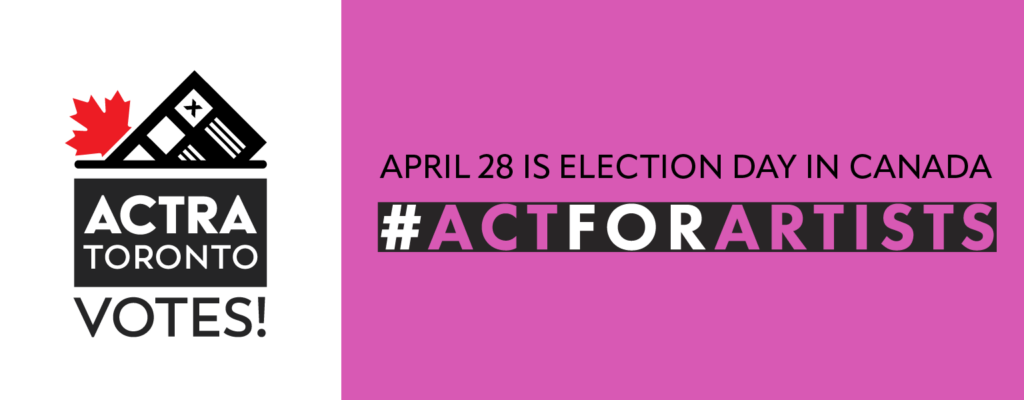
Make Your Voice Heard in the 2025 Federal Election
Election Day is Monday, April 28, 2025!
As performers and artists, our work is deeply impacted by government policies. From investing in the creative sectors to regulation of Artificial Intelligence, the choices made by elected officials shape the future of our industry. This election is an opportunity to make sure our voices are heard and that Canada remains strong in film, television and digital media production.
Are You Registered to Vote?
Visit the Elections Canada website to check your voter registration and find information on where and how to vote, including early voting and mail-in ballot options.
Registering to Vote:
- To be eligible to vote, you must be 18 years of age and a Canadian citizen.
- Confirm, update, or add your voter information to the Register by April 22 to receive a voter information card in the mail with information on when and where to vote. Voter information cards will be in the mail beginning the second week of April.
How to Vote:
There are multiple ways to submit your ballot:
- VOTE BY MAIL: Apply to vote by mail before April 22 at 6 p.m. ET to receive your voting kit by mail
- EARLY VOTING (ELECTION OFFICE): Vote in person at your local election office until 6pm on April 22. Remember to bring your ID.
- ADVANCE VOTING: Vote at any advance voting location in your electoral district from 9 a.m. to 9 p.m. ET from April 18 to 21. Remember to bring your ID.
- ELECTION DAY VOTING: Vote at your assigned voting location on election day.
Source: Elections Canada website

How do I find my riding/electoral district, and who are my local candidates?
In Canada, citizens vote directly for someone to represent them as a Member of Parliament (MP). Your ballot will have a list of candidates vying to represent your electoral district in the House of Commons. ACTRA Toronto encourages its members to find out who’s running what they stand for.
Get Involved: Advocate for Our Industry
Your local candidates need to hear from you! Let them know that a strong, sustainable film and television industry matters. Here’s how you can engage:
- Attend a local all-candidates meeting and ask about their support for our sector.
- Speak with candidates when they come knocking—ask about their commitment to the arts.
- Visit a campaign office and connect with the teams shaping policies that impact our industry.
- Watch a debate or attend a townhall.
Why It Matters:
Last year, Canada’s screen-based industry contributed almost $10 billion in production volume to the country’s GDP and provided almost 180,000 jobs. The province of Ontario was a significant driver of this production, accounting for 32% of all Canadian content production and 27% of foreign service production in the country.
Election Platform Commitments
- Conservative Party of Canada: View full platform.
- Green Party of Canada: View full platform.
- Liberal Party of Canada: Arts & Culture commitments (view full platform).
- New Democratic Party: View full platform.
What to Ask Your Local Candidates
When speaking with candidates, here are some key questions to ask:
1. What will your party do to ensure Canadian stories and voices continue to be seen and heard — especially in the digital age?
- With global streamers dominating, Canadian content risks being drowned out in our own market. We need enforceable rules on visibility and investment.
- Canadian stories help define who we are — to ourselves and to the world. Supporting them is both cultural and economic policy.
- This isn’t about nostalgia — it’s about making sure the next generation of Canadians grows up seeing themselves reflected on screen.
2. Will your party commit to protecting and strengthening Canada’s cultural institutions?
- Cultural institutions like museums, libraries, archives, and performance spaces preserve our national story and local pride — they are not luxuries, they’re legacies.
- These institutions contribute to civic education, tourism, and the economy — especially in smaller communities where they’re vital to local identity.
- The role of cultural institutions in strengthening national unity is imperative. That legacy must be preserved and expanded.
3. Does your party recognize culture and the creative sector as a nation-building priority?
- The arts are not a side hustle — they are a major economic driver, employing hundreds of thousands and contributing billions to GDP.
- Culture fosters civic connection, innovation, and resilience. It’s a unifier in polarized times.
- Investing in culture is like investing in infrastructure — it strengthens the country from the inside out.
4. How will your party protect Canadian performers and creators from the misuse of artificial intelligence?
- AI can now replicate voices, faces, and performances — often without consent or compensation. This poses serious threats to livelihoods, privacy, and identity rights.
- We need clear, enforceable protections in law that respect the rights of performers and creators to control their image,
Campaign Office Visits: A Simple but Impactful Action
Want to make a difference in just 10 minutes? Stop by a local campaign office! These offices are full of volunteers and future decision-makers. A quick visit to introduce yourself, share your perspective as an industry professional, and express your appreciation for their engagement can go a long way.
How to Approach a Visit:
- Introduce yourself:
“Hi, my name is [Your Name], and I’m a professional performer. I wanted to stop by and wish you luck in the upcoming election.” - Share a bit about your work:
Mention a recent project or experience that showcases the importance of our industry. - Encourage continued support:
“Canada’s film and television sector has benefited from all-party support in the past, and we hope that continues after the election.”
This small action helps remind candidates that the arts community is engaged and watching.
Political engagement strengthens our industry and ensures that the needs of performers are front and center in policy decisions. Every conversation counts—let’s make sure our voices are heard!
Watch a Leaders’ Debate
Federal party leaders’ debates are taking place this week! Each debate will be 120 minutes in length without commercial interruption and feature five main editorial themes.
The French-language debate was held on Wednesday, April 16 at 6 p.m. ET, moderated by Patrice Roy, and focused on the following themes:
- Coût de la vie (Cost of living)
- Énergie et climat (Energy and climate)
- Guerre commerciale (Trade war)
- Identité et souveraineté (Identity and sovereignty)
- Immigration et affaires étrangères (Immigration and foreign affairs)
Watch now:
The English-language debate will be held on Thursday, April 17 at 7 p.m. ET, moderated by Steve Paikin, and will focus on the following themes:
- Affordability and the cost of living
- Energy and climate
- Leading in a crisis
- Public safety and security
- Tariffs and threats to Canada
Watch now:
Electoral Townhall on Arts & Culture
The Coalition for the Diversity of Cultural Expressions (CDCE) and OCAD University hosted a 90-minute electoral townhall on Wednesday, April 16, 2025, at OCAD University in Toronto.
This important discussion brought together representatives from Canada’s main political parties (Karim Bardeesy, Liberal Party of Canada; Sandy Crawley, Green Party of Canada; Norm Di Pasquale, New Democratic Party) and allowed candidates to present their commitments to the future of Canada’s arts, culture and creative industries. The townhall was moderated by Ana Serrano, OCAD University’s President and Vice-Chancellor.
As Canada navigates a pivotal period politically, economically, and technologically, the 2025 federal election will be decisive for the future of the cultural sector. The actions of the next government will have a profound impact on the diversity, vitality, and sustainability of Canada’s cultural ecosystem.
The debate was structured into four major thematic areas:
- Funding for the sector & the socio-economic conditions of artists and cultural workers,
- The future of media in Canada,
- Copyright law, and
- The impact of artificial intelligence on the arts and cultural sectors.
Watch now:

1 comments